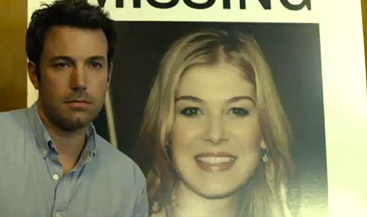|
|
Movie Review: Gone GirlBy Matthew HuntleyOctober 8, 2014
Nick calls the police and Detective Rhonda Boney (Kim Dickens) and Officer Jim Gilpin (Patrick Fugit) show up. Rhonda starts asking questions and leaves Post-it notes around the alleged crime scene. They open a formal missing persons investigation and within a day, Amy’s parents (David Clennon and Lisa Banes) set up a search party headquarters, a telephone hotline and a website, beseeching the community to help them find their daughter. The police also schedule a press conference for Nick to make a statement, although he doesn’t seem to be all that worried or distraught over the recent events. From here on out, the film goes back and forth between the past and present, showing us, among other things, when Nick and Amy first met in New York City seven years ago. Both were successful magazine writers and we learn Amy already came from a wealthy family (she was the inspiration for her mom’s successful children’s book series, “Amazing Amy,” which is something Amy ultimately resents). But when the 2008 recession hit, Nick and Amy both lost their jobs and her parents had to borrow from her trust fund. On top of that, Nick’s mother fell ill, which prompted the couple to leave New York and move back to Nick’s hometown of North Carthage, Missouri. Granted, they’re now living in an impressive home in an otherwise modest neighborhood, but they’re struggling financially and Amy’s diary passages suggest their marriage went from loving to abusive. We’re led to believe Nick isn’t telling the police everything. That’s about as much as I can reveal about the plot without giving away crucial surprises and developments, which are key to the movie engaging us. I haven’t read Flynn’s novel, but her screenplay functions like a page-turner. It’s erotic, suspenseful, sometimes funny, and borders on being a trashy soap opera, aided by additional characters played by Tyler Perry and Neil Patrick Harris. Nevertheless, it’s effective and tantalizing and we almost feel like it’s wrong to enjoy it. At times, it may seem like Gone Girl is jerking us around with all its twists and misdirection, but again, the only reason we might feel this way is because we’re too used to thrillers operating in terms of pre-defined rules, the kind that stipulate things are “supposed” to be a certain way. But director David Fincher has never been one to follow the rules. He makes genre films, but he merely uses the genre as a platform to be cunning and the results often feel like a small cinematic breakthrough (Fight Club, Zodiac, The Social Network). Fincher makes a habit of turning conventions upside down, and not necessarily for upside down’s sake, but because he knows we’ve reached a point in cinema, particularly thrillers, where conventions need to be shaken up to keep things moving. That’s what Gone Girl does - it shakes us up. And even though it’s sometimes absurd, it’s very well made and calculating, not to mention enormously entertaining. If most thrillers hold our attention because we take comfort in the fact we know where they’re ultimately going, Gone Girl thrills us because we don’t.
|

|
|
|

|
Thursday, October 31, 2024
© 2024 Box Office Prophets, a division of One Of Us, Inc.


